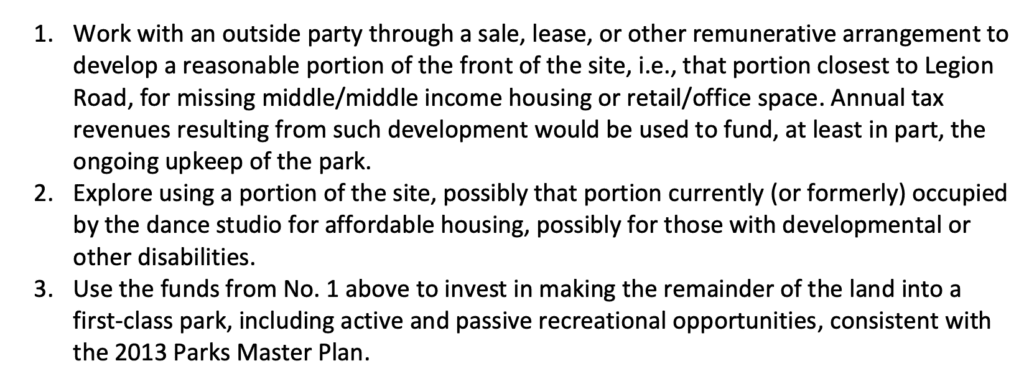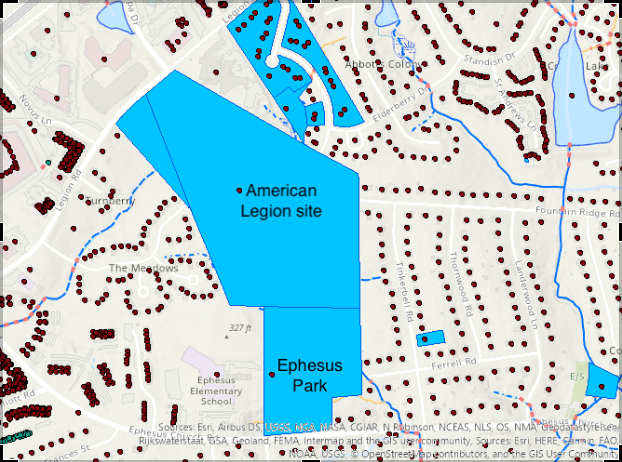Last May, five members of the Chapel Hill Town Council signed a petition to ask the Town Manager to begin the process of developing an “implementable plan” for the development of the American Legion property, a 36-acre piece of land that the town purchased for $7.9 million in 2016. More specifically, the petition asked the Manager to do the following:

Since May, we’ve had a robust debate about the site, with some arguing that the entire piece of property should be left as open space while others argued for housing and a park to be built (See TBB’s coverage of the council discussion in June). In October, Mayor Pam Hemminger (who did not sign the petition) formed a Legion Property Committee, which included two council members who signed the May petition (Michael Parker and Mayor Pro Tem Karen Stegman) and two who did not (Mayor Hemminger and Amy Ryan).
Over the Thanksgiving holiday weekend, the Legion Property Committee (LPC)’s plans were put online. They will be discussed this Tuesday at the Chapel Hill Public Library at a public information meeting, where there will be opportunities for public feedback and comment. It will then be voted on next Wednesday by the Chapel Hill Town Council. Here are the highlights:
Affordable Housing and a Park
While earlier discussions included the possibility of selling off a portion of the property for commercial development, including office space and housing, the LPC recommends that the Town retain ownership of the property.
The majority (27 acres) of the Legion site will be combined with the adjacent Ephesus Park (~11 acres) to create a ~38 acre park that includes active recreation, such as pickleball courts and soccer fields, and passive green space, including 8.6 acres of forest. (As envisioned, this will be bigger than almost every existing park in town.)
Approximately 9 acres will be reserved for the development of subsidized, affordable housing, similar to the Trinity Court project that just received federal funding.
Repairing the pond
One of the stickier issues in the redevelopment of the Legion site is related to the pond, which was created using an artificial dam that is now failing. The LPC plans to seek out technical expertise to determine how best to repair the pond, which may involve shrinking it.
Build a greenway using a Complete Community framework
The LPC recommends building a greenway to, and possibly through, the site to advance its goal of connecting our communities via greenways.
Analysis: A considered compromise, but who will pay for it?
We believe that the LPC recommendations represent a compromise between the signers of the May 2022 petition, who represent a majority of the council (including three members who were elected or re-elected in November 2021), and the voices of those on the council, as well as nearby neighbors, who oppose any development on the property.
In recent years, the town has learned that building subsidized, affordable housing on town-owned land is a viable way to quickly increase the amount of affordable housing in our community and serve people who are of the highest need. We’re getting affordable housing and a park, which is exactly what many pushed for.
On the other hand, the May 2022 petition asked the manager to consider selling some of the property for private development, which would have helped recoup the $7.9 million the town paid for the site and provided an ongoing source of property tax revenue to pay for the upkeep of the park.
By keeping the property off of the tax rolls, the town is effectively asking everyone else to help pay for the development and the maintenance of the site. While the council just finished allocating a surprise pot of money (the ARPA funds), it’s unlikely that they’ll be so lucky in the future. In fact, five years ago, the town considered the financial implications for retaining all 36 acres of the Legion site as town-owned land. Here’s what they found:

The LPC’s plan seems designed to attract a supermajority, if not unanimous, support of the Chapel Hill Town Council. Whether it will lead to a world-class park, which requires money to create and maintain, is another question.

